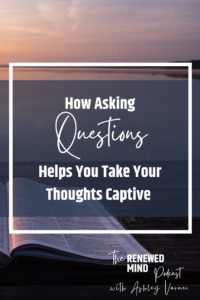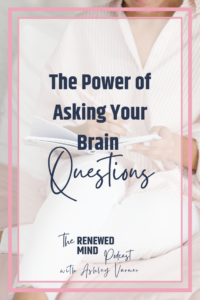Today we’re talking about the power of asking ourselves questions.
God uses questions in the Bible to help people think. And we can follow His lead and ask ourselves questions.
Resources Mentioned:
Biblical Affirmations Episode: https://ashleyvarner.com/biblical-affirmations
Victim Mentality Episode: https://ashleyvarner.com/victim-mentality
The Mindset Reset: https://ashleyvarner.com/mindset
Get Ashley’s ground breaking program The Mindset Reset. It is a self-paced program made to guide you to taking your thoughts captive and finally control your emotions, so they stop controlling you!
Highlights from the Episode:
Today we’re talking about the power of asking ourselves questions. God uses questions in the Bible to help people think. And we can follow His lead and ask ourselves questions.
In the garden of Eden, Genesis 3, God asks, “Where are you?” “Who told you that you were naked?”
God knew the answers, but He asked because His questions brought out the truth.
Jesus does the same thing in Luke 8 when the woman who was plagued with disease was healed by touching the edge of his robe. He asked, “Who touched me?”
In Matthew 16, the disciples are talking to Jesus and He asked them, “Who do people say the Son of Man is?” They answered Him things like John the Baptist, Elijah and Jeremiah or other prophets.
Then Jesus asks them, “But what about you? Who do you say I am? And Simon Peter answered, “You are the Christ, the Son of the living God.”
In these instances, Jesus knew the answers too. But He wanted them to come to the answers on their own.
Our brains are wired for solutions.
So when we’re asked a question, our brains go in overdrive to answer it. I saw this first hand in my life this week.
I was driving and was behind a car with a bumper sticker that said, “Who is John Galt?”
I racked my brain trying to figure out if I knew that name.
When I got home, I googled the name and found out it was from the book Atlas Shrugged.
If I had seen a bumper sticker that said, “I love John Galt” or “John Galt for president” I wouldn’t have had a second thought about the bumper sticker.
But because my brain had to answer the question, it propelled me to find the answer. I even thought about buying the book so I could find out who this guy was!
So how can we use this in our thought lives?
When you find yourself stuck in negative thoughts or unhelpful thoughts, make the conscious choice to change those thoughts to questions.
We talked about “I CAN’T” Statements in last week’s episode – Biblical Affirmations, and I talked about how you need to believe the affirmations you say, otherwise, those thoughts won’t be useful. We talked about how you can bridge thoughts from I can’t —> I can —-> I will —-> I am.
When you’re stuck in negative thinking about a situation, it can be tough to immediately have positive thoughts about it. In those cases, asking yourself questions can really help you.

Examples:
Example 1: I can’t afford that.
Money mindset is an area that can be tough to change. We build our thoughts around money from our parents, from our past experiences, from the number in our bank account.
But remember, your circumstances don’t have to dictate your results with money.
Instead of saying I can’t afford that, you can change it to: Do I want to afford that? And if so, how can I afford that?
See how you can change your negative thoughts about money? If you flat out said “I can’t afford it” your brain doesn’t do anything about the statement except accept it as fact.
When you ask “how can I afford it,” now your brain is going to work to see how you can afford the item. Your brain starts looking for expenses you cut out or ways to make more money.
This is something my husband and I taught our boys early. We wanted them to be problem solvers instead of falling into a victim mentality.
Once you move from negative thinking to a question, it will help bridge your thoughts to more positive ones.
When I feel limited by my beliefs about money, I always remember Psalm 50. It’s a psalm that talks about how everything in the world belongs to God. The verses say that every animal of the forest and the air is God’s. And how He owns the cattle on a thousand hills.
Then the verses go on to say that same God who owns everything says to us “call upon me in the day of trouble; I will deliver you, and you will honor me.”
So anytime I think that money is limited, I look to Him and call on Him.
Instead of saying, “I can’t afford that” I think “My God can afford that, and if He wants me to have it, then He’ll make a way for it to happen.”
But you may not be at that point yet, and that’s okay. You can start by asking yourself a question and build from there.
Okay, let’s look at another example.
Example 2: I can’t stand her.
We’ve all had thoughts like this. There is someone that we just don’t mesh with. Someone who it’s hard to get along with. But remember, in the episode about how our thoughts affect our actions, we looked at the Thought Model that says: our thoughts determine our feelings, our feelings determine our
actions, and our actions determine our results.
So what result do you want to have? Do you want to have a better relationship with this person? If you, then you have the ability to make that happen by first taking your thoughts captive.
That person doesn’t have to change at all for you to have a better relationship with them.
How can I say that?
Well, your relationship with someone is your thoughts about that person.
So if you want to have a better relationship with a friend, start thinking different thoughts about them.
Now, you can’t control their actions and you may not be able to change the circumstance, but you can change the thoughts you think about them.
You may not be able to get to the point right away where you can say, “I enjoy being around her” but you can ask yourself questions like:
What is one thing that I like about her?
How can I be kind despite not liking her?
What kind of person do I want to be?
How do I want to act toward her?
Once you start bringing it back to your thoughts, you can begin to change your emotions about a person.

Example 3: I’m so tempted to… (fill in the blank)
Just like our brains are wired for solutions, they’re also wired to collect evidence to prove what we believe. We’ll talk more more in-depth about that in a future episode but if you think that there is no way to withstand temptation, then your brain is going to look for evidence to support that
belief.
We tend to think that if we are tempted, then the battle is over, we may as well just give in. But that’s exactly the time when we can stand up to the temptation by just changing our thoughts.
I want you to practice thinking overcoming thoughts like “I choose God over … (fill in the blank)” But if you’re not there yet, you can start with asking a question.
You can ask yourself:
Is this something I would be proud to tell others that I did?
Or will I feel regret after I’ve given in to this temptation?
A question that’s even more powerful to ask yourself is an open ended question like “how will I feel about myself if I give in to this temptation?”
Those open ended questions are great for stopping us in our tracks when we’re tempted.
Conclusion
Okay, that’s all I have for today, I hope you enjoyed this episode and I want to encourage you to start asking yourself questions. Take a moment during a difficult situation to sit back and ask yourself if the thoughts you’re thinking are really want you want to think or not.